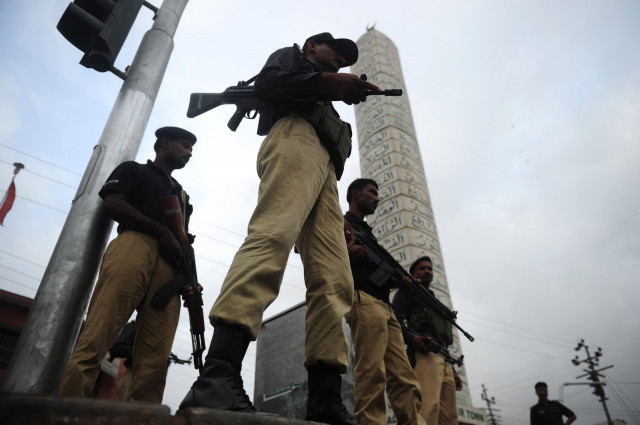Police order amendments : ‘Presence of executive magistracy can cause great harm’
Ex-IG says ‘unholy’ alliance could once arrest anyone without a court appearance

PHOTO: AFP
On the other hand, senior bureaucrats argued that regulatory functions of the district administration had been hampered miserably in the absence of the executive magistracy.
Former Additional Inspector General of Police Sarmad Saeed Khan, while talking to The Express Tribune, took a swipe at the system prior to 2002. He stated the force could remand anyone into custody without presenting them before court and that policemen had an “alliance” with the magistracy.
Sarmad continued in a sarcastic tone and said few problems were faced by the police to register “confessionary statements” under Section 164 of the CrPC. He said that the same was the case with getting detention directions under the Maintenance of Public Order.
Police arrest 13 suspects including six gamblers in Pindi
“Even if a person was killed by the police, the magistracy would provide them cover, saying they issued the order.”
Sarmad even went as far back to the British Raj and pointed out that the Board of Governors of the East India Company had conducted a meeting in 1856. During the moot, a member contended that the police and magistracy were bedfellows and abused power under the system. It was stated that around 95% of judicial inquiries were in favour of police and together they could cause incalculable harm to the public. Therefore, it said the judiciary must be separated from the force by implementing the London Metropolitan Police Act 1829.
He said after the War of Independence in 1857, it was decided there was a need for the Irish Paramilitary policing model to subjugate the public rather than a modern set up.
Discussing the situation after 2002, he said the police did not feel the need for the magistracy.
“They knew that they were responsible for dealing with processions and law and order situations,” he said. “The police were aware that they alone were responsible for their actions and performed their jobs more diligently and carefully.
Former IG Tariq khosa said he worked as an executive magistrate from 1973 to 1975 in Lahore and found the job totally redundant and unnecessary.
Police bust cell phone thieves
“Police is an instrument of rule of law, while a magistrate is an instrument of the government, “he said. “Their unholy alliance could be detrimental to public interest and rule of law. Fake police encounters were justified through probes by magistrates,” he claimed.
In public order management, a magistrate acted as a senior police officer under CrPC and could even pass an order to open fire. “Magistrates never took responsibility,” he said. The former IG stressed public order handling improved after 2002 as the responsibility rested on the senior most police officer present.
“However, the Model Town fiasco was an exception, but that too was carried out under political/bureaucratic orders. This unholy alliance came to an end in 2002. Police excesses are now to be examined by judges and not magistrates,” he said.
Khosa was of the view that the revival of executive magistracy would in no way improve the writ of the state, but would it revive the bureaucratic and political control over the police. “It will undermine the independence of the judiciary and rule of law,” he said. “This is a very dangerous move. If we push Pakistan to the colonial mould of governance from the 19th century, it would be unfortunate,” Tariq said.
“It is like establishing military courts permanently to punish ‘terrorists’. We are about to enter the dark age of draconian statehood.”
A senior retired bureaucrat, on the other hand, said that after 2002, police officers created many posts to enjoy perks and privileges, but did not work to improve the department.
Another senior bureaucrat said the tasks performed by executives could be divided into three major types; regulatory, developmental and general oversight.
After the promulgation of Civil Administration Ordinance 2016, the office of DCO has been designated as deputy commissioner, but the office of the district magistrate not been restored yet.
The Civil Administration Ordinance is regulatory in nature and district officers are required to perform several regulatory tasks. For example, ACs and ADCGs are asked to check drug stores, fine eateries, smuggling of different items and also negotiate with protesters as well as deal with earthquakes etc.
Published in The Express Tribune, June 16th, 2017.



















COMMENTS
Comments are moderated and generally will be posted if they are on-topic and not abusive.
For more information, please see our Comments FAQ